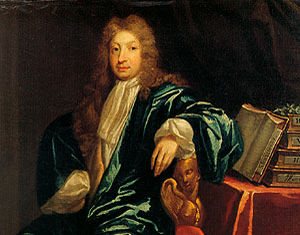Frases célebres de John Dryden
John Dryden Frases y Citas
John Dryden: Frases en inglés
Book III, Ode 29, lines 65–68.
Imitation of Horace (1685)
Grand Chorus.
A Song for St. Cecilia's Day http://www.englishverse.com/poems/a_song_for_st_cecilias_day_1687 (1687)
Fuente: The Major Works
Contexto: So, when the last and dreadful Hour
This crumbling Pageant shall devour,
The trumpet shall be heard on high,
The dead shall live, the living die,
And musick shall untune the Sky.
“Secret guilt by silence is betrayed.”
Pt. III, line 763.
The Hind and the Panther (1687)
“But far more numerous was the herd of such,
Who think too little, and who talk too much.”
Pt. I, lines 532–533. Compare Matthew Prior, Upon a Passage in the Scaligerana, "They always talk who never think".
Fuente: Absalom and Achitophel (1681)
“What passion cannot Music raise and quell?”
St. 2.
A Song for St. Cecilia's Day http://www.englishverse.com/poems/a_song_for_st_cecilias_day_1687 (1687)
Variante: What passion cannot Music raise and quell?
“The trumpet's loud clangor
Excites us to arms.”
St. 3.
A Song for St. Cecilia's Day http://www.englishverse.com/poems/a_song_for_st_cecilias_day_1687 (1687)
“She hugged the offender, and forgave the offense:
Sex to the last.”
Fuente: Fables, Ancient and Modern (1700), Cymon and Iphigenia, Lines 367–368.
“Jealousy, the jaundice of the soul.”
Pt. III, line 73.
The Hind and the Panther (1687)
“Pains of love be sweeter far
Than all other pleasures are.”
Variante: Pains of love be sweeter far
Than all other pleasures are.
“Your ignorance is the mother of your devotion to me.”
The Maiden Queen, Act i, scene 2.
Bartlett's Familiar Quotations, 10th ed. (1919)
“Thespis, the first professor of our art,
At country wakes sung ballads from a cart.”
Prologue to Lee's Sophonisba.
Bartlett's Familiar Quotations, 10th ed. (1919)
“Joy rul'd the day, and Love the night.”
Fuente: Fables, Ancient and Modern (1700), The Secular Masque (1700), Line 82.
“A brave man scorns to quarrel once a day;
Like Hectors in at every petty fray.”
Prologue
All for Love (1678)
“And, like another Helen, fir'd another Troy.”
Fuente: Alexander’s Feast http://www.bartleby.com/40/265.html (1697), l. 154.
“T' abhor the makers, and their laws approve,
Is to hate traitors and the treason love.”
Pt. III, lines 706–707.
The Hind and the Panther (1687)
Fuente: Fables, Ancient and Modern (1700), The Secular Masque (1700), Lines 86–91.
Preface to Translations from Theocritus, Lucretius, and Horace, in Sylvæ: or, The second part of Poetical Miscellanies, published by Mr. Dryden, third edition (London, 1702).
“Like you, an alien in a land unknown,
I learn to pity woes so like my own.”
Aeneis, Book I, lines 889–890.
The Works of Virgil (1697)
“Above any Greek or Roman name.”
Upon the Death of Lord Hastings, line 76. Compare: "Above all Greek, above all Roman fame"; Alexander Pope, Epistle I, Book 2, line 26.
Bartlett's Familiar Quotations, 10th ed. (1919)
"Plutarch's Lives," Vol 1, Barnes & Noble Inc., 2006, Lysander p. 646
Translation from Greek originalː "τὸ ἀληθὲς οὐ φύσει τοῦ ψεύδους κρεῖττον ἡγούμενος, ἀλλ' ἑκατέρου τῇ χρείᾳ τὴν τιμὴν ὁρίζων."
“Can heav'nly minds such high resentment show,
Or exercise their spite in human woe?”
Aeneis, Book I, lines 17–18.
The Works of Virgil (1697)
“So over violent, or over civil,
That every man with him was God or Devil.”
Absalom and Achitophel. Part i. Line 557.
The Hind and the Panther (1687)
Fuente: Mac Flecknoe (1682), l. 19–24.
Act IV, scene i.
Œdipus (1679)
“Nor can his blessed soul look down from heaven,
Or break the eternal sabbath of his rest.”
Act V, scene 2.
The Spanish Friar (1681)
“By viewing Nature, Nature's handmaid Art,
Makes mighty things from small beginnings grow.”
Annus Mirabilis (1667), stanza 155.
The First Book of Homer's Ilias
Fables, Ancient and Modern (1700)
